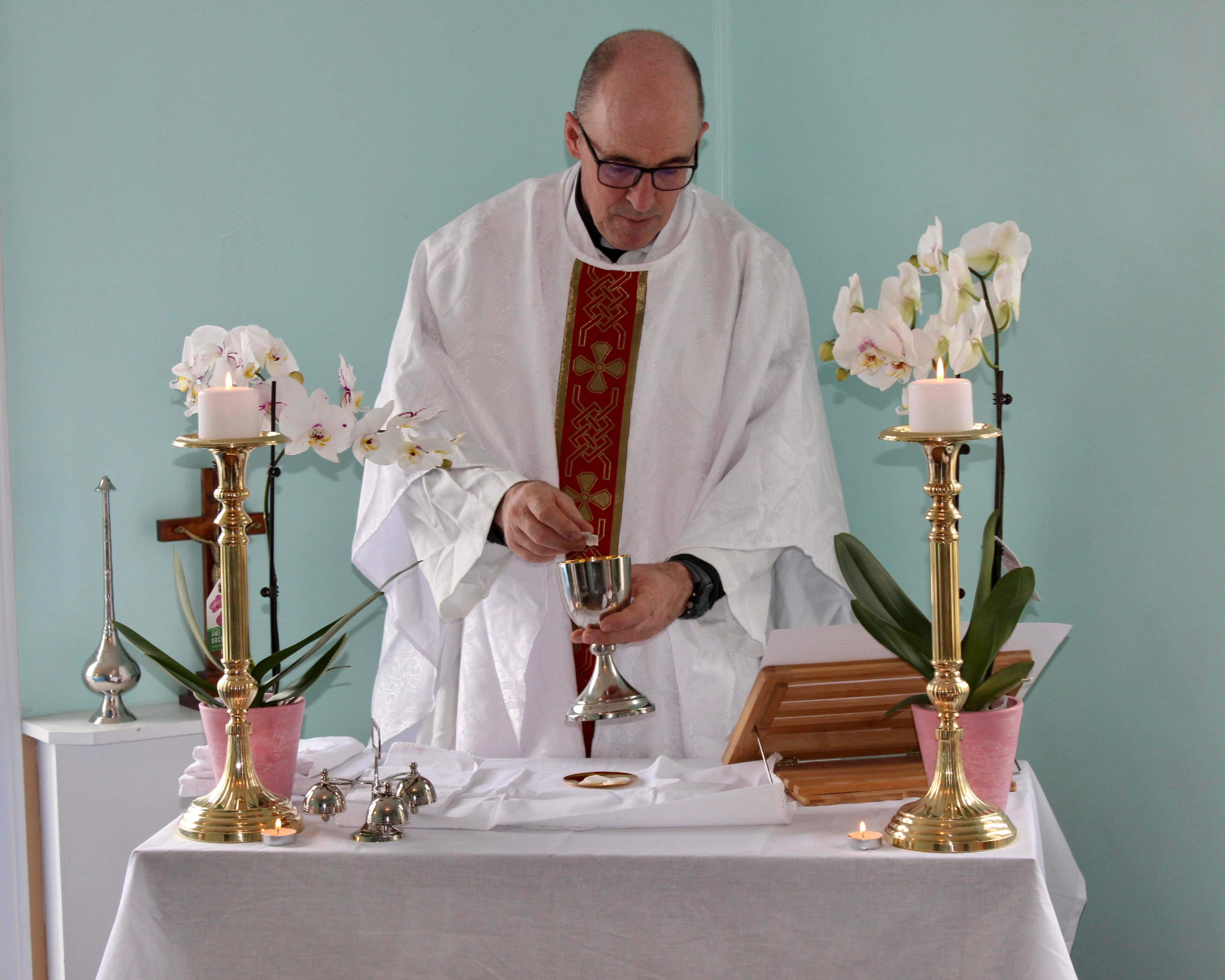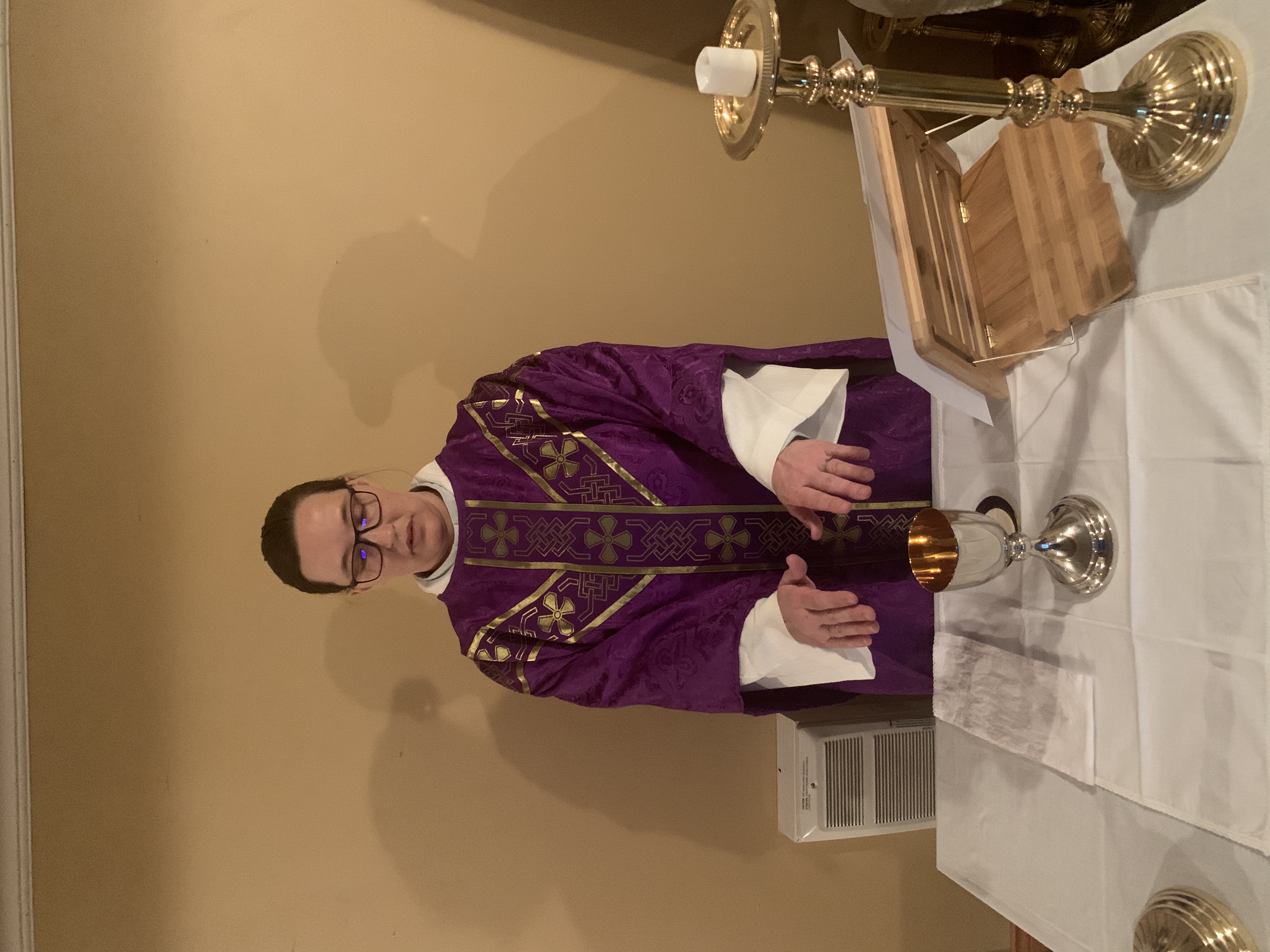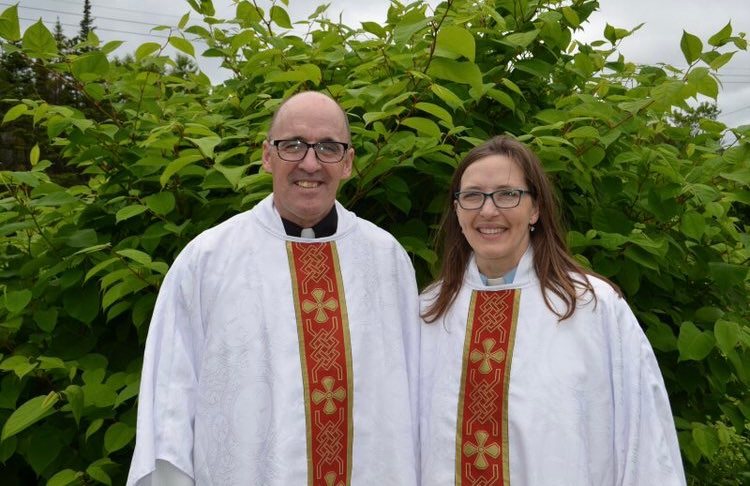- Home
- simply catholic
- Catholic Contentions
- Loss of Clergy Status
Simply Catholic and Welcoming You
Loss of Clergy Status

Archbishop Philip Bradley Saying The Liturgy of The Eucharist
The loss of clergy status or clerical state (commonly referred to as laicization, dismissal, defrocking, and degradation) is the removal of a bishop, priest or deacon, from the status of being a member of the clergy.
The term defrocking originated in the ritual removal of vestments as a penalty against clergy that was eventually codified within the Roman Pontifical. Contemporary Latin Catholic Canon Law does not contain such a ritual, leading some to consider it an inaccurate description of laicization.
In the mainstream Catholic Churches, a bishop, priest, or deacon may be dismissed from the clerical state and thus suffer the loss of their clergy status, as a penalty for certain grave offences, or by a papal decree granted for grave reasons. This may be because of a serious criminal conviction, heresy, or similar matter. It may be termed punitive in nature, when a response to wrongdoing such as the examples stated, or favour in nature when requested by the cleric involved.
Laicization involves cessation of all the rights of the clerical state. It also terminates all obligations of the clerical state. Such that the clergy person losses all claim to clergy status.
Then there is the issue of denominational authority to appoint or dismiss clergy which varies significantly across Christian denominations. Some denominations, like the mainstream Catholic Churches, have a hierarchical structure where bishops (and the Pope) hold significant appointment and dismissal authority. Others, like some Methodist and Presbyterian churches, have a more collegial system with committees and councils involved in these decisions.
Independent Christian Churches, with or without collegial systems, often rule that when you leave their church you leave all clergy rights and status behind also. This is not only in direct contrast to the canons of the mainstream churches but poses challenges the very meaning and validity of a sacrament.
A person need only be baptized once. Receive confirmation once. Arguably be ordained/consecrated only once. This concept is the very premise of incardination, where clergy may move from one denomination to another without the loss of clergy status and with all their clergy rights and obligations protected and ensured.
As mentioned elsewhere on this site, this is an area where church groups who adopt this stance of not with us then not clergy, can get themselves in serious legal trouble and face lawsuits for wrongful dismissal, loss of income, personal damages, due to embarrassment, pain and suffering and more. Independent churches are still subject to employment law, contract law, personal lawsuits, etc. if they do not follow the legal and human resources requirements and expectations of such laws.
Without this being mistaken for legal advice, the actions of any church group that ‘forces out’ clergy can be breach of contract (even when the clergy are unpaid), poisoned workplace, etc. Where a person is dependent upon income directly or indirectly from their position as clergy, example otherwise unpaid clergy earning their income as wedding officiants or clergy marriage commissioners (official designations for different provinces) and the church group suddenly withdraws their clergy status, effectively depriving them of their livelihood, the already mentioned breaches may or may not occur and a lawsuit could still conceivably be successfully undertaken.
Thus, even if the church group's intention was only to protect the integrity of their church, failure to address all of the other issues arising from the church's action may leave them culpable under a number of laws and at fault in a lawsuit. Whether you, as a reader, are a church group or affected former clergy and see a possible issue affecting you in these statements, our advice is to seek proper legal counselling, be that before placing yourself or your group in a liability position or when looking to address a perceived slight.
If you are a church group, your best insurance (in addition to actual insurance) is to follow human resources expectations, specifics of employment and contract law requirements and make sure to keep a sound paper trail and that you act on ‘for cause’ issues, not hurt feelings or egos. A failure in any of these areas will open you up to serious consequences.
Avoiding Loss of Clergy Status

Bishop Charlene Bradley Saying The Liturgy of The Eucharist
So what if your goal is to avoid the loss of clergy status and laicization? Suppose you are clergy in an independent church where you are clearly told that leaving their organization means also you lose your clergy status but you want to maintain your calling as clergy. Suppose you feel a need or calling to go elsewhere in order to continue your ministry.
Regardless of whether you are feeling forced out or are watching a dynamic you’ve seen before where you reasonably expect to be the next to be dismissed or you simply feel called elsewhere, you cannot count on taking your status with you from such a church organization!
Well then it falls on you to plan your exit strategy on your terms and timing and thereafter hope that the administrators of the group you are leaving can be professional and grown ups. Meaning that they will be mature adults who accept your departure without then defaming you within their organization or elsewhere.
Also that they do not, as unfortunately so often occurs, hide their sins under the guise of misused privilege of being ‘under seal’. Such unprofessional behaviors point directly at poisoned work environments, ego and control issues. If you have already seen evidence of such things then our advice is run, don't walk!
If you have tried to appeal previous decisions and been ignored or denied the opportunity to do so, then please come to accept that your departure and anticipated loss of clergy status is only a question of being on your terms or theirs. Plan your exit accordingly.
This is your calling, your ministry and your livelihood. Protect it!
Do your research. Find a church group compatible with you as a person and the ministry you feel called to do. Speak in confidence (this is an appropriate use of the clergy ‘seal’) with their administrator(s). Ensure that they will either incardinate you despite your, at this point still current administrators objections, or they will ordain/re-ordain you into their church community.
Arrange to resign after being assured of acceptance immediately into the group you seek to relocate to and then send your resignation, effective immediately the day of your incardination or ordination into the new group. Make sure to do this (immediately) prior to incardination or fresh ordination to avoid complicating the lives of your new administrators and casting shadows on the appropriateness of your ‘new’ status. Time and date stamps are strongly advised.
Now you are safe in your new position, still clergy and, if dependent on a wedding ‘business’, still in operation. Just with new ‘management’ so to speak.
In mainstream churches and legitimately operated independents, none of this political juggling would be necessary. Appeal procedures would also be in place in the event of any conflict. You would advise your bishop of your discomfort and need to look elsewhere. Investigate your options and your bishop and your prospective future bishop would each assist you to complete the transition as smoothly as possible, for the good of all and with Blessings to you and your future ministry.
Good leaders will actively ensure no loss of clergy status even in cases where the stipulation is that you will forfeit your clergy status upon departure. They will set aside denominational differences in order to assist active clergy continue in ministry, even if no longer with them.
Do not be guilt tripped by cries of obedience to your bishop and vows to a particular church. In true ministry our first loyalty is to Christ and the direction of the Holy Spirit.
A call to ministry is not a prison sentence. In any business, organization or church, people come and go for all manner of reasons. Follow the Spirit and your heart. Mature, righteous leadership sees and freely acknowledges this. Those who do not, you are best to get clear of and quickly.
As a final note, let me point out that following unlawful orders makes us as guilty and accountable as the person issuing the order. That is true under law and under canon law. When we vow obedience we do not forgo our own conscience and accountability. Under no mandate should any person, clergy or otherwise, be subjected to unrighteous dominion. By its very nature that is abuse!
Personal Experience of Avoiding Loss of Clergy Status

Archbishop Philip and Bishop Charlene Bradley Outside and still in Vestments
We went through this ourselves, and then it got worse!
First in a church organization in which we loved our administrators and colleagues. We watched as people were dismissed, even Bishops, usually for disagreeing with or questioning one specific administrator. Their character and actions were then openly called into question within the entire organization and then all reminded that the information was 'under seal' and to have no further communication with the displaced former clergy person.
That is improper application of the clergy seal and the no further communication order is tantamount to 'shunning', which is not a Catholic practice.
Then, when we wrote the first page for our website, one of them exploded over the wording. It could have been changed and, the reason they saw it in the first place was that we asked for their input to ensure we were on target???
We had previously witnessed first hand , as already pointed out, that when this administrator got upset with someone they were soon out of the organization with an immediate call to the Registrar's office to withdraw their clergy status.
We sought to appeal. Instead a letter of discipline was sent to me. Apparently when a man with hearing issues leans into the computer on a Zoom call, that is attempted intimidation! Yeah, apparently from three thousand kilometers away and over a Zoom call this bishop felt intimidated?
We saw the writing on the wall and planned our exit accordingly.
We researched and found another church body compatible with us and our planned ministry. We explained our circumstances and made the appropriate arrangements. We resigned and were re-ordained to avoid conflicts and problems for our ongoing ministry. All was good...
Until we found that the bishop they in turn had sent to ordain us was involved in practices not consistent with the canons nor the laws of the land. When called to account for himself, he quit on the spot. He has been trying to smear us and our ministry since with twisted stories, fabrications and outright lies. He now operates an independent church organization of his own.
We keep very detailed records including receipts, emails and screen shots of other media communications. (Did I previously mention I taught Use of Force and Legal Academics, Evidence Collection and Preservation and that my wife is a Business Major with a background in Human Resources.) Keep copious records people, the day may come when you need them. Unfortunately there are those who listened to him instead of fact checking. Including our previous church organization.
The organization who had taken him on clearly dodged a bullet when we got involved and both found and reported his actions. Liability averted!
The politics and egos in ‘church’ organizations can be life altering and lacking in social justice and ethics. This is the nature of mankind. Not the Holy Spirit and clearly not the way Christ espoused.
Church organizations, clergy and administrators are often skilled, even trained, to say all the right things, pray beautifully and demonstrate exceptional interpersonal, ministry skills. The idea is to get investigators and congregants to listen to the words and 'buy in'.
Please take the time to step back a little, stop 'listening' and simply observe. Do their actions match their words? When do they not and how important is the disconnect really? People are people, even bishops will tell you what shows them and their church in the best possible light.
Stop listening and just watch the organizations 'big picture response'. Not their public relations exercises. Then, when they actually show you who they really are, believe them. Now you can make a fully informed decision to stay or go. Your biggest questions should be are they serving Christ or themselves? Serving God and their fellow man or their own bottom line? How do they treat their other clergy? Rest assured, you will NOT be a exception to their treatment of their subordinates.
Any organization that holds your position, status or income as ransom to control you is exercising unrighteous dominion over you and breaking canon law (even when they argue that they have their own Canon Law to support their actions) and the laws of the land. Please seek a righteous alternative!
Bishops are people too. When some are called out for wrongdoing they would rather switch the narrative than take ownership or responsibility and make the necessary changes in their lives and operations. We are all human and subject to error. This is why we have confessions, forgiveness and reconciliation. However each of these are predicated on remorse, repentance and the intent to do better.
You should reasonably expect to become the villain in a narrative written by those you rightfully stood up to or choose to step away from. When moving from righteous leadership to another denomination this will not happen and, usually, both sides will seek to maintain a respectful and healthy relationship after the exit from the original organization. They may be saddened by your departure and yet will still genuinely want to see you and your ministry succeed.
Follow the Holy Spirit, live as Christ taught and may you and your ministry be truly Blessed.
Recent Articles
-
The Basic Catechism of the Catholic Church
Feb 12, 26 11:03 AM
A basic catechism of any rite or branch of the catholic church acts as a primary reference for teaching the faith -
The Divine Office
Feb 07, 26 11:07 AM
The Divine Office The Divine Office, also known as the Liturgy of the Hours or Opus Dei ("Work of God"), is the official, daily set of prayers of the Catholic Church -
Women Being Removed or Voided from Scriptures
Jan 17, 26 05:06 PM
The concept of women being "removed" or "voided" from scriptures refers to both the physical exclusion of female narratives in historical texts...
Boat Harbour West, Newfoundland, Canada. Cell Number 709-276-0626
Join Us Also on Our St. Brigit's Community Catholic Church Prayer group on Facebook: https://www.facebook.com/groups/324523956473448


